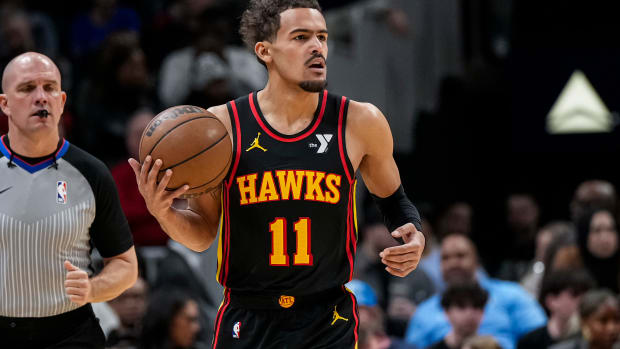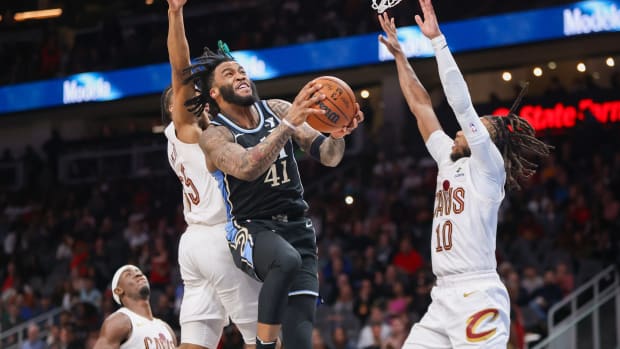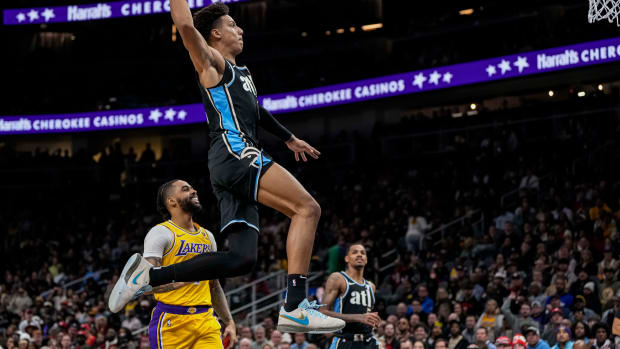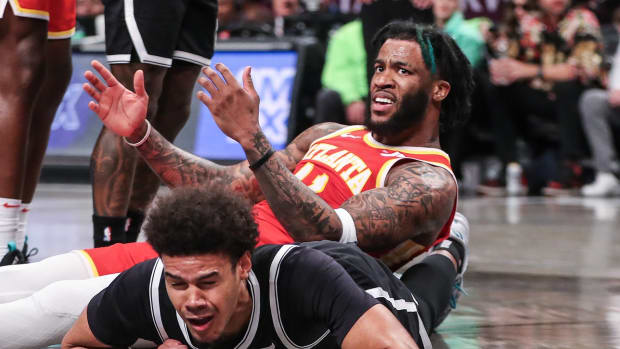Hawks vs. Suns Game Preview
When the Hawks visited Phoenix two months ago, the Suns were among the most pleasant surprises of the NBA season. The upstart group had overachieved its way to a 7-4 record behind breakout performances from nearly everyone on the roster. The team’s offense hummed at a top-three rate behind a career year from Devin Booker, while Aaron Baynes anchored a top-10 defense. The Suns coasted past Atlanta, 128-112, in a game that would ultimately become a high-water mark for the season.
But fortunes turn quickly in the NBA, and the Hawks will face a markedly different opponent Tuesday night than they did in November. Phoenix is 9-19 in its last 28 games and features a slightly different cast of players than it did in the first go-round with Atlanta. While Booker has sustained his offensive output (and legitimately inserted himself into All-Star consideration), most every other Sun has regressed after an unsustainable start. Phoenix has the 19-ranked offense in the NBA since November 16 with a minus-five net rating, and has lacked the punch on either end of the floor that propelled them to such a promising start. The return of second-year center Deandre Ayton has offered some relief from the team’s dry spell – Phoenix has won four of its last seven games with Ayton in the lineup – but he alone isn’t a panacea.
Game Time: Tuesday, January 14, 2020, 7:30 p.m. ET
Location: State Farm Arena, Atlanta, GA
TV: FOX Sports Southeast, FOX Sports Arizona
Streaming: NBA League Pass, FOX Sports Go
Still, Booker gives opponents something to worry about every night. The 23-year-old is averaging nearly 26 points per game on a career-high 62.2 percent true shooting while handing out 6.5 assists per game. Phoenix’s offense is largely rooted in his ability to stretch defenses as a shooter and create with the ball in his hands, and he can score in myriad ways from nearly anywhere on the court.
“I think it starts with Booker,” Lloyd Pierce said. “How do you keep him from getting touches? And when he does have the basketball he’s become kind of an all-around threat. He’s no longer just a scorer. They’ll post him, they’ll put him in pick-and-roll, they’ll bring him off pin-downs, and then he’s also making plays for other guys. So it’s really good to see his development and what he’s able to do.”
First-year Sun Ricky Rubio has helped alleviate some pressure from Booker’s shoulders as an offensive initiator capable of organizing and steadying Phoenix’s offense – an element the team hasn’t had for most of Booker’s career. Despite their offensive decline, the Suns still rank second in the NBA in assists, in large part because of Rubio’s passing and facilitation. “I think he’s brought a mentality for their unit,” Pierce said. “Ball movement, simply plays, just sharing the basketball, playing well.”
Rubio, Booker, and Kelly Oubre were all instrumental in the Suns’ win over Atlanta in November, when Atlanta was sloppy on both sides of the ball and grew visibly frustrated over the course of the game. Phoenix methodically picked the Hawks apart as Booker and Oubre combined for 57 points while Rubio dished eight assists in just 30 minutes.
“They really took us out of it in the second half last time we played them,” Pierce said. “They did a good job getting behind our defense, getting lobs, hitting our rollers. It was one of those funky games where they stepped in front of our rollers. They got a lot of offensive fouls on Alex [Len] and Damian [Jones].”
Indeed, the Suns drew several cheap charges by simply standing behind Atlanta’s roll men, blind-siding them, and crashing to the floor on first contact. That sort of behavior is a smart exploitation of a rule that badly needs reconstructing, but makes for a frustrating viewing experience all the same. The prospect of an offensive foul will be in the Hawks’ heads on Tuesday whenever they roll or drive to the rim, and Atlanta will have to be smarter about how it works around Phoenix’s propensity for baiting opponents into charges.
They’ll likely try to use Collins popping to 3-point range as often as possible or screen help defenders searching for charges. “We’ve got some plans,” Pierce said. “It’s hard. You’re telling your bigs to roll with force, but rolling with force is why they stepped in front and got charges. … There’s a lot of different things we can do, but as long as they guys are aware that’s the most important part.”
Young & Hunter Probable Against Phoenix
Trae Young missed Atlanta’s last game with a sore hamstring and De’Andre Hunter was shut down due to a nagging finger injury once the game against Brooklyn got out of hand, but both participated in shootaround Tuesday morning and are likely to play against the Suns.
Young had 21 points and 13 assists when the Hawks visited Phoenix while Hunter played perhaps his best defensive game as a pro. Hunter’s size and length will be an important part of Atlanta’s defensive approach on Booker, although Cam Reddish will likely start out defending him if both rookies start.
The Suns present an interesting matchup for Atlanta in the frontcourt. Monty Williams as experimented with starting Ayton and Booker together, and that alignment has been quite effective in limited minutes. Baynes isn’t liable to bully smaller defenders in the post, but his offensive rebounding ability demands like-sized defenders to keep him off the boards. Ayton is a more traditional scoring center who can punish mismatches – although if his post-ups come at the expense of Booker operating with the ball, the Hawks will probably live with a smaller defender on Ayton.
Phoenix’s size will likely render Atlanta’s small unit with Collins at center untenable, and thus bump Reddish out of the starting five. But with Bruno Fernando away from the team and Alex Len out with back pain for Tuesday’s game, the Hawks may have no choice but to use Collins primarily at center. (I would bet on Collins starting at center so that Atlanta has one big man it can bring off the bench rather than having to stagger its only two center options, but the Hawks may need the extra bulk when Baynes and Ayton share the floor.)
Regardless of who he starts, Pierce will have to distribute minutes carefully in the frontcourt, Hunter and Vince Carter will likely see time at power forward, and one may even slide to center for short bursts when neither Baynes nor Ayton is on the floor.




